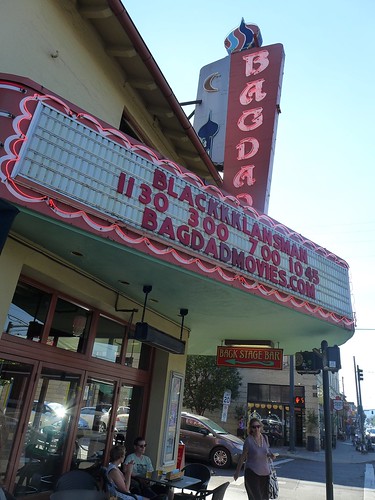In a stroke of genius (the kind of stroke we like) I realized I could invite people seeing this 3 PM matinee at the Bagdad to adjourn to my place for discussion. I put out an invitation through the Meeting listserv working on racial justice. That worked. We had some interesting conversation in my living room, which gave me a lot more perspective.
For example, as the movie opens, we're panning back, revealing a tragic vista: war wounded as far as the eye (camera) can see, with some woman picking through them looking for her doctor. I remarked how this scene seemed obviously phony in the sense of cinematographic, a no-brainer observation on my part, given film had not evolved to this degree by Civil War times, duh.
Lori explained this was a scene lifted directly from Gone with the Wind. That set the stage for a number of film excerpt citations, most notably from The Birth of a Nation, the Mein Kampf of Yankee racist films, President Wilson among its fans.
I sensed Spike Lee, the director, was keeping it obvious and in our faces that this is / was a film, which achieves authenticity not by fooling us into thinking its some kind of documentary, but by framing a tale and making sure we understand its message, its morals.
There's a clear cut villain, with a veneer of respectability, sewn together from the remnants of a shattered way of life. In the meantime, the heroic blacks are still struggling to gain a sense of identity, starting over with new names in some cases.
We hear a white cop sneeringly refer to Muhammad Ali for opting out of his more local heritage, and taking a more African-sounding name. We hear blacks express ambivalence and outright hostility to the Vietnam war. Why fight "for freedom" overseas when it's really the home front that needs heroes?
Our black protagonist has always wanted to be a police officer and indeed he has the personal skills to fit in, his parents having raised him in a disciplined, military-flavored home. He'd been to college instead of Vietnam, but shows signs he'll be obedient. He gets along with his peers and quickly earns their respect, although the token bad apple cop is not going to earn ours.
We're glad when the bad apple cop gets his comeuppance.
The audience gets a lot of what it wants in this movie, if predisposed to support the Union and its melting pot values. However in watching Klansmen cheer and hoot at The Birth of a Nation, we're aware, again, that movies are in the business of programming, using our biases and emotions as their raw material.
In acknowledging its own role as a movie with a point of view, destined for the pile of what gets re-watched a lot on Netflix (a film for the ages) it gives itself permission to hit our buttons and make its points, what movies do.
The choreography, almost musical, comes to the foreground near the climax, as the camera switches back and forth between an all black and all white audience, each in the act of propagating their lore.
The blacks are in a teach in listening to Harry Bellafonte describe the horrors of lynching.
The whites are inducting their new members by means of religious ritual.
The Klan scoops a lot of memes from Christianity, including its stereotypical attitude towards Jews, who killed Jesus (himself a Jew, as one of our Quakers pointed out). The film is almost as much about hating Jews as hating blacks, and the impact of this hate on its targets.
The phoniness of the opening scene is traded for actual footage from the now infamous Charlottesville episode, a murder scene, towards the end.
We're given to understand that racism, and how racism impacts the police force, did not somehow die in the 1900s. Not that anyone in our audience suffered from that illusion.
We would love to grow beyond this karma, but seem to be stuck in a lot of vicious circles, to put it mildly. Feuds have a way of not fizzling. Some in our discussion group expected things to get worse, before they get better.
Interestingly, David Duke is still around to give us reaction shots and is popping up on Youtube with his own analysis. I've done some poking around, and will of course be doing a lot more. Data mining in Youtube is what I do for a living it sometimes seems.
Having viewed this film, I'm now better positioned to follow the debates that bring it up. I would encourage others to view it for the same reason, as shared heritage.

